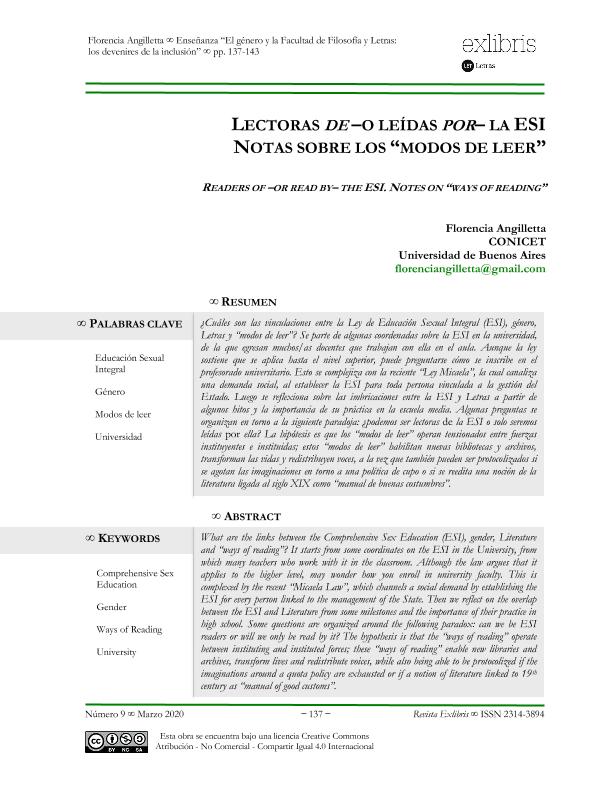Artículo
¿Cuáles son las vinculaciones entre la Ley de Educación Sexual Integral (ESI), género, Letras y "modos de leer"? Se parte de algunas coordenadas sobre la ESI en la universidad, de la que egresan muchos/as docentes que trabajan con ella en el aula. Aunque la ley sostiene que se aplica hasta el nivel superior, puede preguntarse cómo se inscribe en el profesorado universitario. Esto se complejiza con la reciente "Ley Micaela", la cual canaliza una demanda social, al establecer la ESI para toda persona vinculada a la gestión del Estado. Luego se reflexiona sobre las imbricaciones entre la ESI y Letras a partir de algunos hitos y la importancia de su práctica en la escuela media. Algunas preguntas se organizan en torno a la siguiente paradoja: ¿podemos ser lectoras dela ESI o solo seremos leídas por ella? La hipótesis es que los "modos de leer" operan tensionados entre fuerzas instituyentes e instituidas; estos "modos de leer" habilitan nuevas bibliotecas y archivos, transforman las vidas y redistribuyen voces, a la vez que también pueden ser protocolizados si se agotan las imaginaciones en torno a una política de cupo o si se reedita una noción de la literatura ligada al siglo XIX como "manual de buenas costumbres". What are the links between the Comprehensive Sex Education (ESI), gender, Literature and “ways of reading”? It starts from some coordinates on the ESI in the University, from which many teachers who work with it in the classroom. Although the law argues that it applies to the higher level, may wonder how you enroll in university faculty. This is complexed by the recent “Micaela Law”, which channels a social demand by establishing the ESI for every person linked to the management of the State. Then we reflect on the overlap between the ESI and Literature from some milestones and the importance of their practice in high school. Some questions are organized around the following paradox: can we be ESI readers or will we only be read by it? The hypothesis is that the “ways of reading” operate between instituting and instituted forces; these “ways of reading” enable new libraries and archives, transform lives and redistribute voices, while also being able to be protocolized if the imaginations around a quota policy are exhausted or if a notion of literature linked to 19th century as “manual of good customs”.
Lectoras de -o leídas por- la ESI: Notas sobre los "modos de leer"
Título:
Readers of –or read by– the ESI: Notes on “ways of reading”
Fecha de publicación:
10/2020
Editorial:
Universidad de Buenos Aires. Facultad de Filosofía y Letras. Departamento de Letras
Revista:
Ex Libris
e-ISSN:
2314-3894
Idioma:
Español
Tipo de recurso:
Artículo publicado
Clasificación temática:
Resumen
Palabras clave:
Educación Sexual Integral
,
Género
,
Modos de leer
,
Universidad
Archivos asociados
Licencia
Identificadores
Colecciones
Articulos(SEDE CENTRAL)
Articulos de SEDE CENTRAL
Articulos de SEDE CENTRAL
Citación
Angilletta, María Florencia; Lectoras de -o leídas por- la ESI: Notas sobre los "modos de leer"; Universidad de Buenos Aires. Facultad de Filosofía y Letras. Departamento de Letras; Ex Libris; 9; 10-2020; 137-143
Compartir




